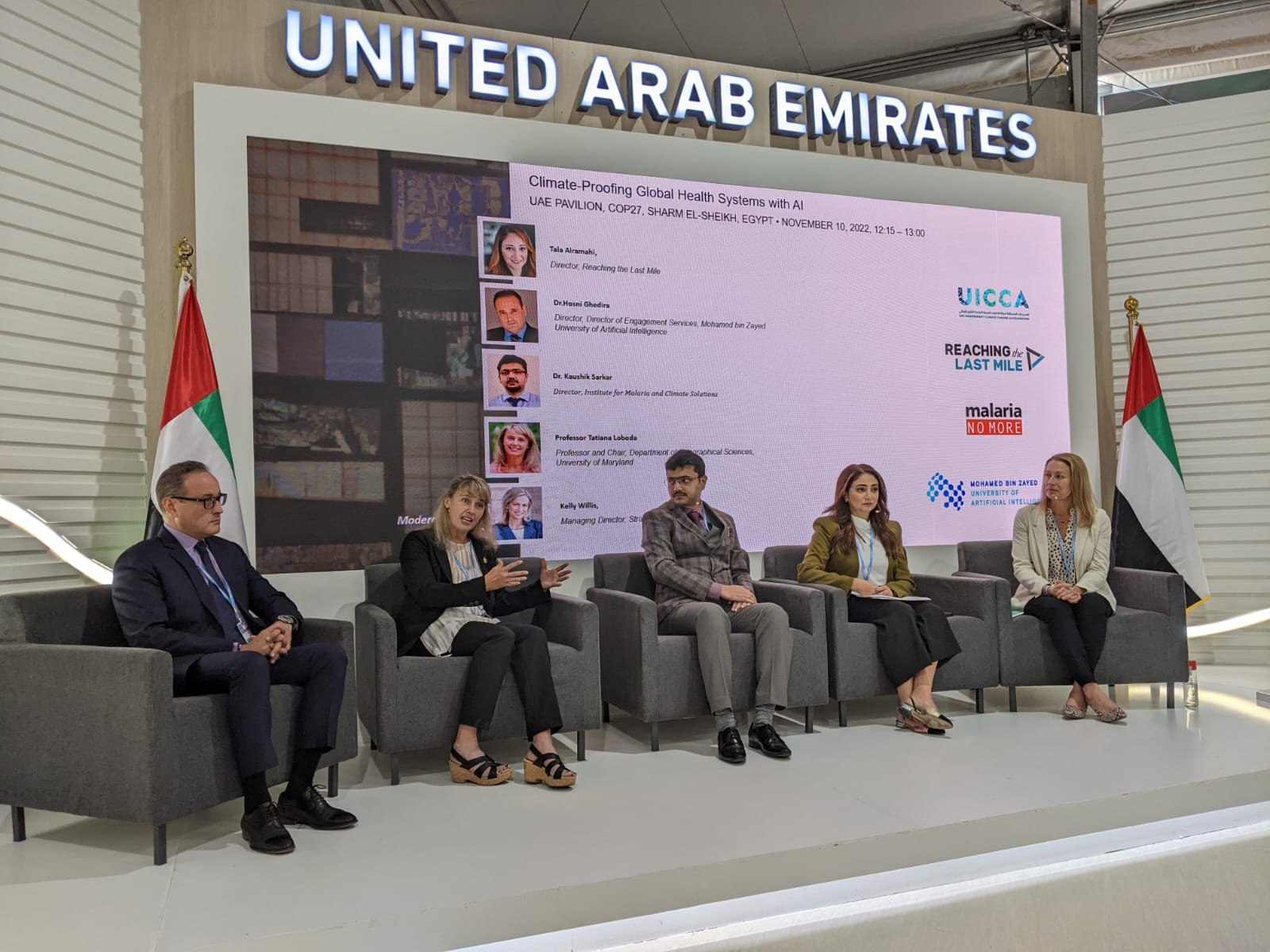At the 2022 United Nations Climate Change Conference (COP27) in Sharm El-Sheikh, Egypt, during a session on climate change and global health, Malaria No More, in partnership with the Reaching the Last Mile initiative, hosted a panel discussion through its climate and global health initiative, Forecasting Healthy Futures. The session, entitled “Climate-Proofing Global Health Systems with Earth Observation Data, Artificial Intelligence, and other transformative technologies”, centered on making global health systems resilient to changing climate conditions.
How can we "climate-proof" global health systems?
Leverage Technology
“Technology is playing an important part in improving the livelihoods of many across the globe and it is time to leverage it through artificial intelligence, earth observation data and other technologies to climate-proof global health.” - Her Highness Shamma Al Nahyan, Philanthropist and Founder, CEO of Alliances for Global Sustainability
Innovate Solutions
“We need to climate-proof our global health systems and our disease elimination systems. Fortunately, there is a groundswell of new innovation in this category that we are starting see: highly sophisticated technologies that help predict where, when and to what extent disease outbreaks will occur so that we can act in advance and prevent those outbreaks.” - Kelly Willis, Managing Director, Strategic Initiatives, Malaria No More
Enhance Tools
“The amount of data that we have from satellite observing systems is just incredible…what we have is complete global coverage from some systems every few days and from other systems almost daily. It can be more than that. And this deluge of data really is a phenomenal resource, but it also brings challenges in terms of how do we take advantage of all this information that is coming our way?” - Professor Tatiana Loboda, Professor and Chair, Department of Geographical Sciences, University of Maryland
Track Trends
“There are trends that can be detected, and they can be used to take action in advance…that require advance techniques using artificial intelligence to process all this data in nearly real-time and provide end users with information that can be used to make wise decisions about action.” - Dr. Hosni Ghedira, Director of Engagement Services, Mohamed bin Zayed University of Artificial Intelligence
Expand Investment
“Leveraging private sector partners who are spearheading innovation in this field…can play a catalytic and strategic role…It is incredibly important….And hopefully creating more climate-based solutions. We believe at Reaching The Last Mile that staying ahead of the curve and climate-proofing our global health systems is critical to the work that we’re doing on disease elimination.” - Tala Al-Ramahi, Director, Reaching the Last Mile
Foster Collaboration
“You need multi-sectoral, multi-disciplinary, multi-level collaboration…To ensure climate justice, you need Global South at the table...because they are the hardest hit and they need to be the planner of their solutions through local capacity building.”- Dr. Kaushik Sarkar, Director, Institute for Malaria and Climate Solutions
Watch the full panel discussion:
###
About Malaria No More
Malaria no More envisions a world where no one dies from a mosquito bite. More than a decade into our mission, our work has contributed to historic progress toward this goal. Now, we’re mobilizing the political commitment, funding, and innovation required to achieve what would be one of the greatest humanitarian accomplishments – ending malaria within our generation. For more information, visit www.MalariaNoMore.org.
About Forecasting Health Futures
Forecasting Healthy Futures is a growing coalition of global health, technology, and public sector partners coming together to bring greater attention to the inequities at the intersection of global health and climate change, and to promote proactive solutions that use integrated data and artificial intelligence to anticipate and mitigate the worst health effects of a warming planet. Forecasting Health Futures’ partners include Reaching the Last Mile, Mohamed Bin Zayed University of Artificial Intelligence, the Global Institute for Disease Elimination (GLIDE), PATH, the Tableau Foundation, IBM’s Weather Company, and the Institute for Health Metrics and Evaluation (IHME). For more information, visit: www.ForecastingHealthyFutures.org
About Reaching the Last Mile
Reaching the Last Mile (RLM) is a portfolio of global health programs working towards disease elimination that is driven by the personal commitment of His Highness Sheikh Mohamed bin Zayed, President of the United Arab Emirates. The Initiative provides treatment and preventative care in communities that lack access to quality health services, with a specific focus on reaching the last mile of disease elimination. RLM’s mission represents His Highness’s dedication to ending preventable diseases that affect the world’s poorest and most vulnerable communities and helping millions of children and adults live healthy, dignified lives. For more information, visit: https://www.ReachingTheLastMile.com
About Mohamed bin Zayed University of Artificial Intelligence (MBZUAI)
MBZUAI is a graduate, research university focused on artificial intelligence, computer science, and digital technologies across industrial sectors. MBZUAI aims to empower students, businesses, and governments to advance artificial intelligence as a global force for positive progress. The university offers an array of graduate programs designed for the pursuit of advanced, specialized knowledge and skills in artificial intelligence including computer vision, machine learning, and natural language processing. For more information, please visit www.mbzuai.ac.ae

